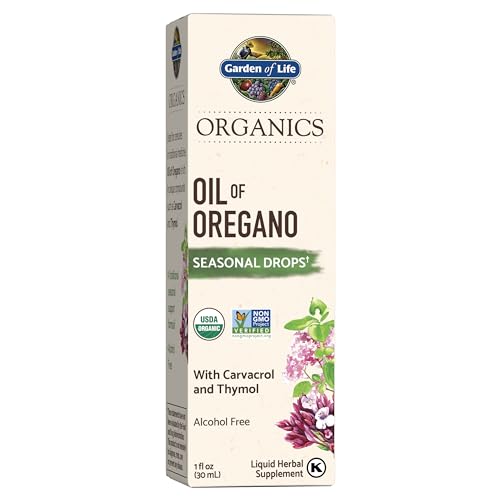
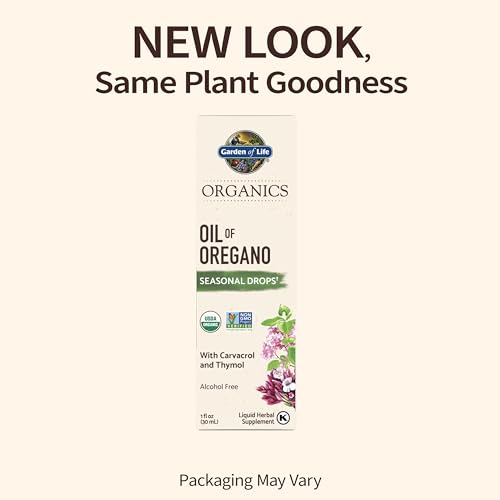
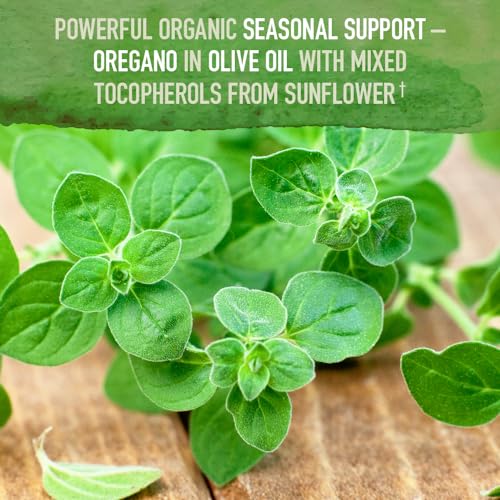
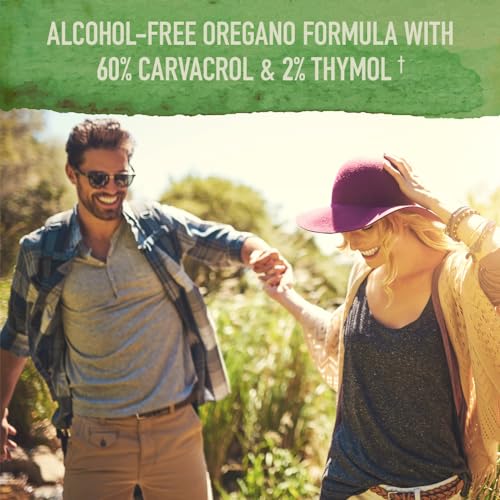
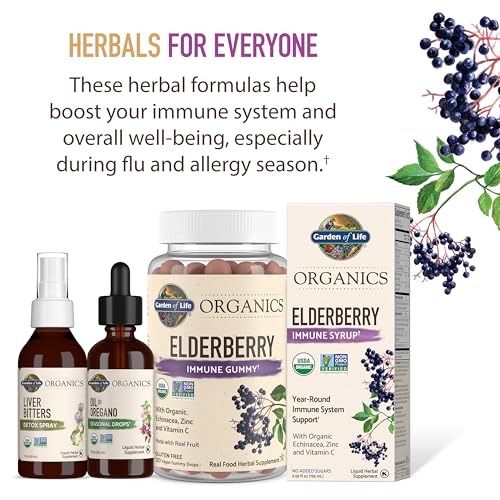
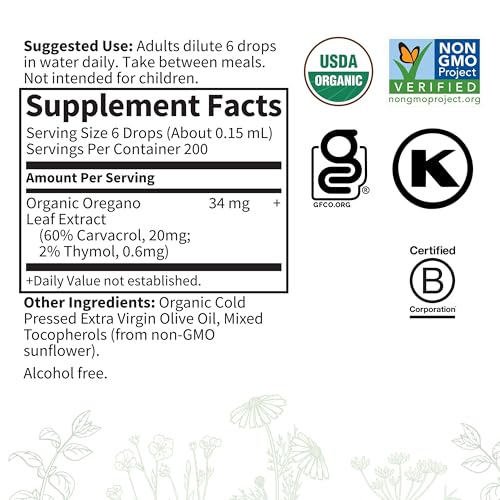
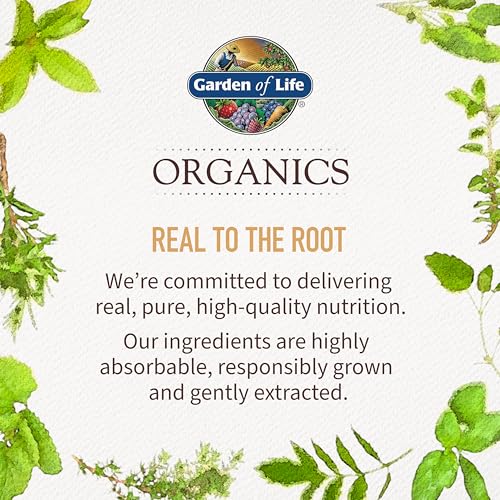
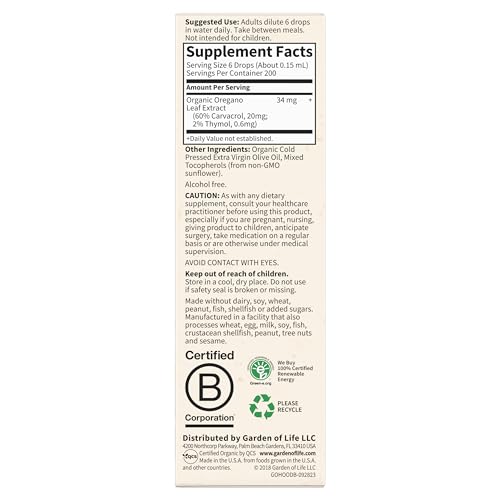
Garden of Life Organics Oil of Oregano Drops - Immune Support, Alcohol-Free, Organic - 1fl oz


Helianthus Annuus (Sunflower)
Medium RiskHelianthus annuus, commonly known as sunflower, is a plant often used in cosmetic and food products for its oil, which serves as an emollient and moisturizer. It is valued for its lightweight texture and skin-conditioning properties, making it a popular choice in formulations.
Sustai Insights
Sunflower oil provides effective moisturizing benefits and is often sustainably sourced, supporting eco-friendly practices. However, it has a moderate risk of allergenic potential, with some individuals experiencing reactions. Environmental concerns include its role in agricultural practices, which may involve pesticide use. Regulatory assessments indicate low risk for carcinogenicity and reproductive toxicity, with minimal usage restrictions. Overall, while sunflower oil is generally safe, consumers should be mindful of allergies and consider alternatives like jojoba oil for sensitive skin types. The overall assessment of this ingredient is medium risk.
Thymol
Medium RiskThymol is a substituted phenol, primarily recognized for its role as an antibacterial and antifungal agent in various products. It is commonly used in formulations for its preservative properties and to enhance product stability.
Sustai Insights
Thymol exhibits functional benefits such as effective antimicrobial properties, making it valuable in preserving products. It is generally considered to have low health risks, with limited concerns regarding carcinogenicity, allergies, or reproductive toxicity. Environmental risks include its potential as a pollutant, though it is not highly bioaccumulative. Regulatory bodies have placed moderate use restrictions on thymol due to these factors. Overall, thymol presents a medium risk assessment, and safe usage practices should be followed, with consideration given to possible sustainable alternatives.
Sesamum Indicum (Sesame) Oil
Low RiskSesamum indicum (sesame) oil is derived from the seeds of the sesame plant. It is commonly used in cosmetic formulations due to its emollient properties and ability to nourish the skin. This oil is rich in fatty acids and antioxidants, contributing to its effectiveness in various skincare products.
Sustai Insights
Sesame oil offers several functional benefits, including moisturization and nourishment for the skin, along with potential antioxidant properties. It is generally regarded as safe, with low concerns regarding carcinogenicity, allergies, and reproductive toxicity. Environmental risks are minimal, and the oil is not known to be bioaccumulative. Regulatory bodies do not impose significant restrictions on its use. Overall, sesame oil poses a low risk, making it a viable ingredient in cosmetic formulations, although consumers should consider potential allergies and choose responsibly sourced products.
Triticum Vulgare (Wheat)
Low RiskTriticum vulgare, commonly known as wheat, is a cereal grain primarily used in food products and various cosmetic formulations. It serves as a source of carbohydrates and can also function as a binding agent, thickener, or emulsifier in formulations. Wheat is widely recognized for its role in nutrition and its diverse applications in the food industry.
Sustai Insights
Triticum vulgare offers functional benefits as a binding agent and source of carbohydrates, with sustainable attributes if sourced responsibly. Health risks are low, with minimal concerns regarding carcinogenicity, allergies, or reproductive toxicity. Environmental risks, including pollution potential, are also low. Regulatory bodies do not currently impose restrictions on its use. Overall, the risk level associated with this ingredient is low, making it a safe choice for both consumers and the environment.
Milk
Low RiskMilk is whole milk from cows, primarily used as a source of nutrition and an ingredient in various food products. It contains proteins, fats, carbohydrates, vitamins, and minerals, contributing to its functional benefits in culinary applications.
Sustai Insights
Milk provides essential nutrients and serves as a versatile ingredient in food, enhancing flavor, texture, and nutritional value. It is generally regarded as safe with low concerns for carcinogenicity, allergies, or developmental toxicity. Environmental risks are minimal, and regulatory bodies impose no significant warnings. However, individuals with lactose intolerance or dairy allergies should exercise caution. Overall, milk is assessed as low risk based on current scientific consensus.
Egg
Low RiskEgg is the entire content of chicken eggs, commonly used as an ingredient in various products for its nutritional and functional properties.
Sustai Insights
Eggs are known for their functional benefits, including serving as a binding agent and providing protein. They are typically sustainably sourced and biodegradable. Health risks are considered low, with minimal concerns regarding carcinogenicity, allergies, or reproductive toxicity. Environmental risks are also low, with no significant pollutant potential. Regulatory bodies do not impose current restrictions on egg usage. Overall, the risk level is low, and safe usage practices should be observed, though alternatives like plant-based substitutes may be considered for those with allergies.
Sesamum Indicum (Sesame) Oil
Low RiskSesamum indicum (sesame) oil is derived from the seeds of the sesame plant. It is commonly used in cosmetic formulations due to its emollient properties and ability to nourish the skin. This oil is rich in fatty acids and antioxidants, contributing to its effectiveness in various skincare products.
Sustai Insights
Sesame oil offers several functional benefits, including moisturization and nourishment for the skin, along with potential antioxidant properties. It is generally regarded as safe, with low concerns regarding carcinogenicity, allergies, and reproductive toxicity. Environmental risks are minimal, and the oil is not known to be bioaccumulative. Regulatory bodies do not impose significant restrictions on its use. Overall, sesame oil poses a low risk, making it a viable ingredient in cosmetic formulations, although consumers should consider potential allergies and choose responsibly sourced products.
Triticum Vulgare (Wheat)
Low RiskTriticum vulgare, commonly known as wheat, is a cereal grain primarily used in food products and various cosmetic formulations. It serves as a source of carbohydrates and can also function as a binding agent, thickener, or emulsifier in formulations. Wheat is widely recognized for its role in nutrition and its diverse applications in the food industry.
Sustai Insights
Triticum vulgare offers functional benefits as a binding agent and source of carbohydrates, with sustainable attributes if sourced responsibly. Health risks are low, with minimal concerns regarding carcinogenicity, allergies, or reproductive toxicity. Environmental risks, including pollution potential, are also low. Regulatory bodies do not currently impose restrictions on its use. Overall, the risk level associated with this ingredient is low, making it a safe choice for both consumers and the environment.
Helianthus Annuus (Sunflower)
Medium RiskHelianthus annuus, commonly known as sunflower, is a plant often used in cosmetic and food products for its oil, which serves as an emollient and moisturizer. It is valued for its lightweight texture and skin-conditioning properties, making it a popular choice in formulations.
Sustai Insights
Sunflower oil provides effective moisturizing benefits and is often sustainably sourced, supporting eco-friendly practices. However, it has a moderate risk of allergenic potential, with some individuals experiencing reactions. Environmental concerns include its role in agricultural practices, which may involve pesticide use. Regulatory assessments indicate low risk for carcinogenicity and reproductive toxicity, with minimal usage restrictions. Overall, while sunflower oil is generally safe, consumers should be mindful of allergies and consider alternatives like jojoba oil for sensitive skin types. The overall assessment of this ingredient is medium risk.
Milk
Low RiskMilk is whole milk from cows, primarily used as a source of nutrition and an ingredient in various food products. It contains proteins, fats, carbohydrates, vitamins, and minerals, contributing to its functional benefits in culinary applications.
Sustai Insights
Milk provides essential nutrients and serves as a versatile ingredient in food, enhancing flavor, texture, and nutritional value. It is generally regarded as safe with low concerns for carcinogenicity, allergies, or developmental toxicity. Environmental risks are minimal, and regulatory bodies impose no significant warnings. However, individuals with lactose intolerance or dairy allergies should exercise caution. Overall, milk is assessed as low risk based on current scientific consensus.
Egg
Low RiskEgg is the entire content of chicken eggs, commonly used as an ingredient in various products for its nutritional and functional properties.
Sustai Insights
Eggs are known for their functional benefits, including serving as a binding agent and providing protein. They are typically sustainably sourced and biodegradable. Health risks are considered low, with minimal concerns regarding carcinogenicity, allergies, or reproductive toxicity. Environmental risks are also low, with no significant pollutant potential. Regulatory bodies do not impose current restrictions on egg usage. Overall, the risk level is low, and safe usage practices should be observed, though alternatives like plant-based substitutes may be considered for those with allergies.
Thymol
Medium RiskThymol is a substituted phenol, primarily recognized for its role as an antibacterial and antifungal agent in various products. It is commonly used in formulations for its preservative properties and to enhance product stability.
Sustai Insights
Thymol exhibits functional benefits such as effective antimicrobial properties, making it valuable in preserving products. It is generally considered to have low health risks, with limited concerns regarding carcinogenicity, allergies, or reproductive toxicity. Environmental risks include its potential as a pollutant, though it is not highly bioaccumulative. Regulatory bodies have placed moderate use restrictions on thymol due to these factors. Overall, thymol presents a medium risk assessment, and safe usage practices should be followed, with consideration given to possible sustainable alternatives.
Discover the natural power of Garden of Life Organics Oil of Oregano Seasonal Drops. This concentrated plant-based immune support product combines tradition with modern convenience, delivering a potent 34mg of organic oregano leaf extract in each serving. Perfect for environmentally and health-conscious consumers, this alcohol-free, vegan, and gluten-free herbal supplement is crafted from sustainably sourced ingredients.
- Seasonal Support: Formulated to provide immune support during changing seasons with 34mg of organic oregano leaf extract per serving.
- Natural Ingredients: Made from organic oregano leaves and cold-pressed olive oil, ensuring purity without harmful additives.
- Water Extracted & Alcohol-Free: Utilizing gentle water extraction, these drops are alcohol-free, making them suitable for all dietary preferences.
- High Potency: Each serving contains 60% Carvacrol and 2% Thymol, delivering powerful benefits in just 6 drops added to water.
- Traceable & Certified: This product is third-party certified, organic, non-GMO, and carbon neutral, emphasizing sustainability and ethical sourcing.
Subscribe & Save with Sustai
- Best Price Guarantee: Always enjoy the lowest prices on sustainable home essentials.
- No Surprises: We’ll notify you before shipping. No hidden fees, ever.
- You’re in Charge: Change, pause, or cancel your subscription anytime with ease.
- Eco-Friendly Deliveries: Our grouped shipments mean less packaging and lower emissions.
Join us on a sustainable journey. Special offers for a limited time! Prices and promotions may change.
Recommended Products
Discover the natural power of Garden of Life Organics Oil of Oregano Seasonal Drops. This concentrated plant-based immune support product combines tradition with modern convenience, delivering a potent 34mg of organic oregano leaf extract in each serving. Perfect for environmentally and health-conscious consumers, this alcohol-free, vegan, and gluten-free herbal supplement is crafted from sustainably sourced ingredients.
- Seasonal Support: Formulated to provide immune support during changing seasons with 34mg of organic oregano leaf extract per serving.
- Natural Ingredients: Made from organic oregano leaves and cold-pressed olive oil, ensuring purity without harmful additives.
- Water Extracted & Alcohol-Free: Utilizing gentle water extraction, these drops are alcohol-free, making them suitable for all dietary preferences.
- High Potency: Each serving contains 60% Carvacrol and 2% Thymol, delivering powerful benefits in just 6 drops added to water.
- Traceable & Certified: This product is third-party certified, organic, non-GMO, and carbon neutral, emphasizing sustainability and ethical sourcing.

You can have at most 2 Sustainable Steals products in your cart
Customer Reviews
Customers’ View
Customers appreciate the effectiveness and health benefits of the Oregano Oil Seasonal Drops, highlighting its potency and natural formulation. Many users note that it serves as a strong immune booster and provides relief for sore throats, with one customer mentioning, "it helps with temporary pain relief and improves gut health." The product's clean, organic ingredients and alcohol-free extraction process resonate with health-conscious consumers, who value its safety and quality. While some customers find the taste and smell to be quite strong, they overall consider it a worthwhile investment due to its numerous health properties, including anti-inflammatory and anti-fungal benefits. Overall, customers find this product effective and aligned with their sustainable lifestyle.
AI-generated from the text of customer reviewsThis product has no reviews yet.




